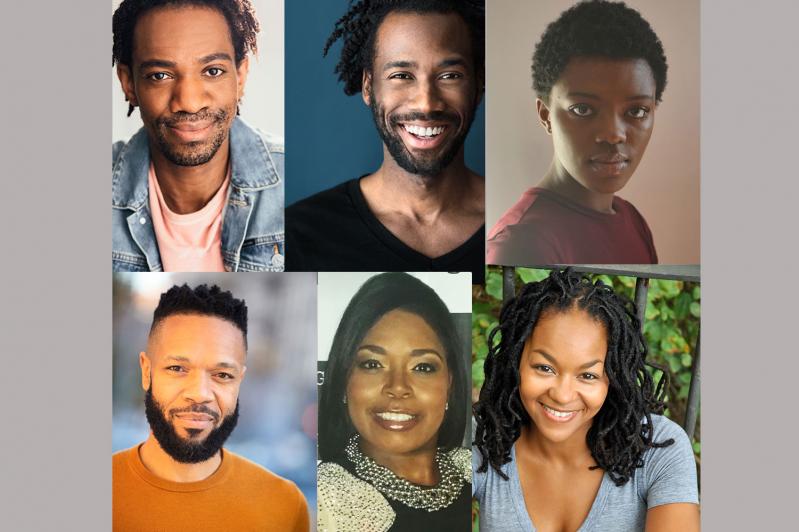Last July, "We See You, White American Theater," a coalition of Black, Indigenous, and other theater artists of color, issued a set of demands signed by more than 300 theater professionals and endorsed online by thousands more. The call for racial equity was heard by Scott Schwartz, the artistic director of Bay Street Theater in Sag Harbor, and Will Pomerantz, its associate artistic director, who contacted Reggie D. White, a director, writer, actor, and signer of the statement.
"I've known Scott and Will for about six years and we've been in regular contact as frequent collaborators," Mr. White said during a phone conversation. "They thought the moment of pause in in-person programming was a moment for Bay Street to participate in a conversation about racial equity and racial justice. So they reached out to me about creating something, and also maybe directing it."
The result, a theatrical view of race in America titled "In Case You Hadn't Heard: A Conversation Between America's Past and Its Promise," will have its world premiere via Zoom on Monday at 8 p.m.
Mr. White was inspired in part by a virtual project he did with the Vineyard Theatre in New York that used found text as a source material. "But I also wanted to create something different," he said, "something that extricated the ideas from the original speakers and gave their words to a chorus of people who are holding that legacy."
He turned to the speeches and interviews and writings of 20 people whom we would now call "influencers," ranging from James Baldwin to Stokely Carmichael to Angela Davis, some famous, others less so. "All of us are where we are because of the work of Frederick Douglass and Fannie Lou Hamer and Malcolm X, and all of the 20 people and the 20 million other people we couldn't fit into this piece," Mr. White said.
"I was interested in speeches that don't come up every Black History Month, or every time we talk about racial justice or voting rights or prison reform. Angela Davis has been speaking about these issues for 60 years, yet we don't talk about her work or the outsized role women have played in the fight for equality."
Darryl Gene Daughtry Jr., Crystal Dickinson, Jason Veasey, and Clarissa Vickerie perform the play. None of them portrays a particular speaker. "The way Reggie organized the script, the texts are all mixed in," Ms. Vickerie explained. "Everyone does everyone. The sources of the words are only identified at the very end of the production. It's interesting to hear these words, many of which reach back to the civil rights movement, and find they still make sense spoken today."
The reason that the lines are interchangeable and the sources are not revealed until the end, Mr. White said, is that he wanted to stress the ideas rather than the people. "Sometimes we get into this cult of personality where we're so fascinated with the human being that we don't really grapple with their ideas. I was excited to create a mosaic and piece together those words and thoughts."
He began working on the project with Mr. Schwartz and Mr. Pomerantz in September. Everything -- workshops, rehearsals, and the actual performance -- was done virtually. "They had us record on Zoom," said Ms. Vickerie, "but the actual audio they're using is from our phones, which they felt had better quality."
The audience will see the four actors in a Zoom screen. "Reggie did a wonderful job of making it very natural and gave us a lot of space to ad lib here and there," Ms. Vickerie said. "It sounds quite conversational, even though all the language was generated from the 20 sources. Nothing we're saying is new, but it sounds as if it's coming out of our heads at that moment."
While she acknowledged that working remotely with other actors was challenging at first, "Now I know what to expect. I know I'm not going to be able to actually be in the same space as the other actors, but we were really able to do a great job sitting there and being in the moment with each other."
When Mr. Schwartz and Mr. Pomerantz first contacted him about creating a project focused on racial equity and racial justice, Mr. White said he felt "exhausted, like most Black people, about having to explain things that seem to be beyond explanation. These are conversations that have been going on among ourselves for, literally, 400 years."
But once he worked out the form the project would take, he dove deeply into all those years of speeches and writings. "One of the things that was important to me is that Scott and Will were generous idea partners, because they're working on a project from a point of view they don't have. They're brilliant artists in their own right . . . and there was a lot of generosity offered in the rehearsal space."
The evening will include a live-streamed talkback between the actors and the director, led by Georgette Grier-Key, executive director of the Eastville Community Historical Society in Sag Harbor. The cost to register is $10 and a link to registration is on the theater's website.




